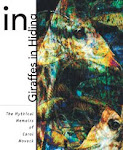On the other hand, how to explain the Jewish neo-cons? I guess their DNA is defective.
-----------------------------------------------------
Tribal vs. Covenantal Jewish Identity
By Sidney Schwarz
As I reflect on the millennial span of Jewish history, it seems clear to me that the tension between the efforts to insure Jewish group survival and the impulse of Jews to live in accordance with the highest possible ethical standards, is a paradox that was part and parcel of the Jewish condition. I see Exodus and Sinai as metaphors for the twin impulses that are at work in Jewish history, Jewish community and Jewish identity. The Exodus impulse is that tendency that brings Jews together in political and institutional arrangements to support the continuity of the group or "tribe" and that triggers our communal response to threats to group survival. The Sinai impulse in Jewish history and community is a way to speak about how Jews have sought to ally with the most vulnerable members of society in the spirit of prophetic Judaism. Exodus represents tribal Jewish identity while Sinai represents covenantal Jewish identity.
Seven values drive Judaism's Sinai impulse: compassion for others (chesed); a respect for the dignity of all of God's creation and creatures (tzelem elohim); the obligation to be pursuers of peace (bakesh shalom v'rodfeihu); the warning not to ignore the suffering of others (lo taamod at dam re'echa); the requirement to seek harmonious relationships with those are not Jewish (darchei shalom); the need to love the stranger in your midst (ahavat ger); and the seeking after what is right and true (emet).
Jews have internalized these values so deeply that, even as modernity weakened the tie between most Jews and their heritage, the attitudes and behaviors implicit in these values manifest themselves as an ethnic ethos. This explains why it is that Jews were so prominent in the civil rights struggle, the persistence of liberal voting patterns despite socio-economic trends that would suggest growing conservatism, and why Jews are in the leadership of so many organizations that are devoted to the welfare of society and the world.
Articles on Secular Judaism for Interfaith Families InterfaithFamily.com
Tribal vs. Covenantal Jewish Identity
By Sidney Schwarz
As I reflect on the millennial span of Jewish history, it seems clear to me that the tension between the efforts to insure Jewish group survival and the impulse of Jews to live in accordance with the highest possible ethical standards, is a paradox that was part and parcel of the Jewish condition. I see Exodus and Sinai as metaphors for the twin impulses that are at work in Jewish history, Jewish community and Jewish identity. The Exodus impulse is that tendency that brings Jews together in political and institutional arrangements to support the continuity of the group or "tribe" and that triggers our communal response to threats to group survival. The Sinai impulse in Jewish history and community is a way to speak about how Jews have sought to ally with the most vulnerable members of society in the spirit of prophetic Judaism. Exodus represents tribal Jewish identity while Sinai represents covenantal Jewish identity.
Seven values drive Judaism's Sinai impulse: compassion for others (chesed); a respect for the dignity of all of God's creation and creatures (tzelem elohim); the obligation to be pursuers of peace (bakesh shalom v'rodfeihu); the warning not to ignore the suffering of others (lo taamod at dam re'echa); the requirement to seek harmonious relationships with those are not Jewish (darchei shalom); the need to love the stranger in your midst (ahavat ger); and the seeking after what is right and true (emet).
Jews have internalized these values so deeply that, even as modernity weakened the tie between most Jews and their heritage, the attitudes and behaviors implicit in these values manifest themselves as an ethnic ethos. This explains why it is that Jews were so prominent in the civil rights struggle, the persistence of liberal voting patterns despite socio-economic trends that would suggest growing conservatism, and why Jews are in the leadership of so many organizations that are devoted to the welfare of society and the world.
Articles on Secular Judaism for Interfaith Families InterfaithFamily.com












No comments:
Post a Comment